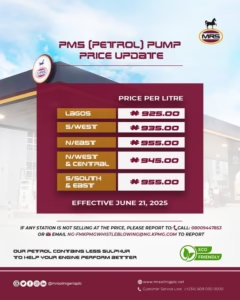Major petroleum marketer, MRS, has raised the pump price of petrol to N925 per litre in Lagos, and as high as N955 in the Southeast, following an upward review in ex-depot prices by Dangote Refinery.
This marks a significant spike from the N885 per litre sold in Lagos on Friday, signaling further strain on consumers already grappling with high fuel costs across the country.
According to a post on its official X (formerly Twitter) handle on Saturday, MRS announced new region-based prices now effective nationwide. In Ogun, Oyo, Ondo, Osun, and Ekiti, petrol now sells at N935 per litre, while the North East and Southeast both face N955 rates. The North West and North Central will pay N945.
The announcement came less than 24 hours after the Dangote Petroleum Refinery raised its ex-depot price—the price at which marketers buy directly from the refinery—from N825 to N880 per litre.

MRS is one of the key distributors of products from the Dangote refinery, alongside other partners like Heyden and AP, who are also expected to adjust prices in the coming days.
The latest increase comes amid rising global crude oil costs and constrained local supply, as the Dangote refinery continues to rely on imported crude due to shortages from domestic producers.
Meanwhile, concerns are growing over the widening gap between falling international crude prices and stagnant or rising fuel prices locally. The President of the Petroleum and Natural Gas Senior Staff Association of Nigeria (PENGASSAN), Festus Osifo, criticized marketers for allegedly exploiting Nigerians.
Speaking on Monday, Osifo stated that petrol should currently be retailing between N700 and N750 per litre, given global oil trends, and accused marketers of price manipulation to boost profits.
The price hike is expected to ripple across the economy, impacting transportation costs, food prices, and household expenses, especially as inflation remains stubbornly high.
Industry stakeholders are calling for increased transparency in pricing and a clearer regulatory framework to ensure fair competition and consumer protection as Nigeria navigates its fully deregulated downstream oil sector.


